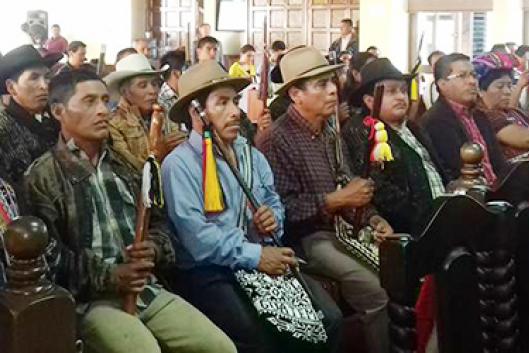Guatemala is located in the heart of Mesoamerica. Its enormous cultural diversity is a historical legacy of the Mayan culture, in which indigenous communities have developed systems of organizational thought and self-government—always tied to knowledge based on their worldview, spirituality and the continuous maintaining and renewing of their relationship with Mother Earth.
At present, communities face a serious threat of new land grabs related to the use of biotechnology, as well as socio-economic requirements that homogenize a single way of understanding tradition and culture — all in order to plunder and sell genetic diversity, seeds, flora, wildlife, etc. This has caused the dramatic and irreversible loss of ancestral systems, agro-biodiversity and the traditional knowledge associated with these systems and diversity; a situation in which the transnational market economy logic strategically guarantees legal actions for the legalized dispossession of communities.
Guatemalan ancestral authorities, farmers, peasants, midwives and spiritual guides were motivated to defend the organizational and governmental sovereignty of indigenous communities. In coordination with member organizations of the National Network to Defend Food Sovereignty and other social organizations, they met to address the implications of the economic, political and legal commitments the Guatemalan government has assumed vis-à-vis other States. These include treaties, agreements, or international protocols which, when implemented, translate into violations of human rights and the collective rights of indigenous peoples.
It was no longer possible to allow the State to facilitate the plunder and dispossession of indigenous communities' lands—especially since these actions are no longer focused solely on oil and mining projects, hydroelectric dams, and industrial palm and sugar plantations (among others), but also seek to take away seeds, genetic diversity, traditional knowledge and biodiversity.
In addition to the government's actions, there are research centers that favor biotechnology, and thus pharmaceutical and agribusiness companies. In 2014, these companies jointly promoted a series of congresses, seminars, and workshops where they argued for the need to “protect” and “facilitate” the conditions to approve several legislative initiatives on behalf of Guatemalan indigenous peoples. The Congress of the Republic of Guatemala immediately provided the conditions for their approval. Such is the case with the Law on Plant Varieties, and the Nagoya and Cartagena Protocols.
This also facilitates the conditions, already well-established by the government and transnational companies, and provides a roadmap, for dispossession. Government institutions serving market interests have moved to approve the regulation on Genetically Modified Organisms, the national biosecurity policy on Genetically Modified Organisms, and the policy project on Access to Genetic Resources and Traditional Knowledge. Each instrument focuses on arguments that the State has sovereign access to use all natural "resources," failing to consider indigenous communities' systems of government and everything that constitutes their collective heritage.
This series of legal instruments no longer considers the collective rights of communities to value, use, manage, exchange and locally control the elements of nature—rights which are inalienable, unassailable and imprescriptible.
Therefore ancestral authorities from the four directions, through consensus, arranged to resist this new form of silent dispossession, which is already affecting and altering life in the communities. They filed an action of unconstitutionality against Decree 6-2014, which approves, at the national level, the “Nagoya Protocol on Access to Genetic Resources and the Fair and Equitable Sharing of Benefits Arising from their Utilization." (1) The action denounces this instrument for violating indigenous peoples' sovereignty by validating “legalized” dispossession; as it authorizes patents, land concessions, royalties and intellectual property rights on genetic diversity and traditional knowledge of native seeds, medicinal plants, handicrafts and gastronomy. An important motivation behind the action against the Constitutional Court of Guatemala is in the demand for the right to free, prior and informed consultation, and respect for systems of organization, production, safeguards and defense of community livelihoods.
This action resulted in the Constitutional Court of Guatemala provisionally suspending Decree 6-2014 (which approves the Nagoya protocol) on June 16th of this year. (2) The State now cannot continue approving laws, agreements, regulations and policies related to the approval of requests for access to, or patent authorizations on, intellectual property rights that involve genetic diversity and Guatemalan indigenous communities' traditional knowledge. This is also a victory for communities throughout the country, who succeeded in getting the State to respond to the national lawsuit led by their ancestral authorities.
In this way, resistance movements defending life and territory have shown that peaceful, national-level mobilizations have succeeded in repealing the 2014 Law Decree 19-201, or the Law on Plant Varieties (3), more commonly known as the Monsanto Law (4). This is a clear example of unity within diversity, since there was broad participation of social groups, including peasant, indigenous and environmental movements and organizations, among others. (5)
For many indigenous communities, this action represents the preservation of ancestral systems, guaranteeing life and food sovereignty. Thus the struggle to defend territories continues in Guatemala, and communities will keep building ties of solidarity; not as a mere “folkloric” expression or national statistic, but as the face of struggle, resistance and denunciation of the dispossession of ancestral and territorial identity, as Aj ral Ch´ooch´ (Children of Mother Earth).
Lourdes Gómez Willis, lourdes.gomez@congcoop.org.gt
Research assistant, IDEAR/CONGCOOP http://idear.congcoop.org.gt/
(1) The text of the Nagoya Protocol is available at:
https://www.cbd.int/abs/about/default.shtml and the text of the Convention on Biological Diversity is available at: www.cbd.int/intro/default.shtml
(2) Access the Unconstitutionality Ruling of Decree 6-2014 on the Nagoya Protocol here:
http://www.biodiversidadla.org/Objetos_Relacionados/Resolucion_de_Inconstitucionalidad_ante_aprobacion_de_Protocolo_de_Nagoya_-_GUATEMALA
(3) The Law on Plant Varieties threatened food sovereignty and life, by opening the doors to companies' privatization of native seeds (including maize and bean varieties) and to the introduction of transgenic seeds. It was part of the commitments the Guatemalan State made in the framework of the Free Trade Agreement between the United States and Central America, signed in 2005.
(4) “Lucha por la defensa de nuestras semillas, derogación total del Decreto 19-2014” en: www.redsag.net/files/Boletn_tres_versin_final.pdf y “Postura de las autoridades ancestrales ante los organismos vivos modificados” en:
https://comunitariapress.wordpress.com/2016/07/23/postura-de-las-autoridades-ancestrales-ante-los-organismos-vivos-modificados/
(5) https://www.facebook.com/bancada.winaq/posts/1346052475462723
